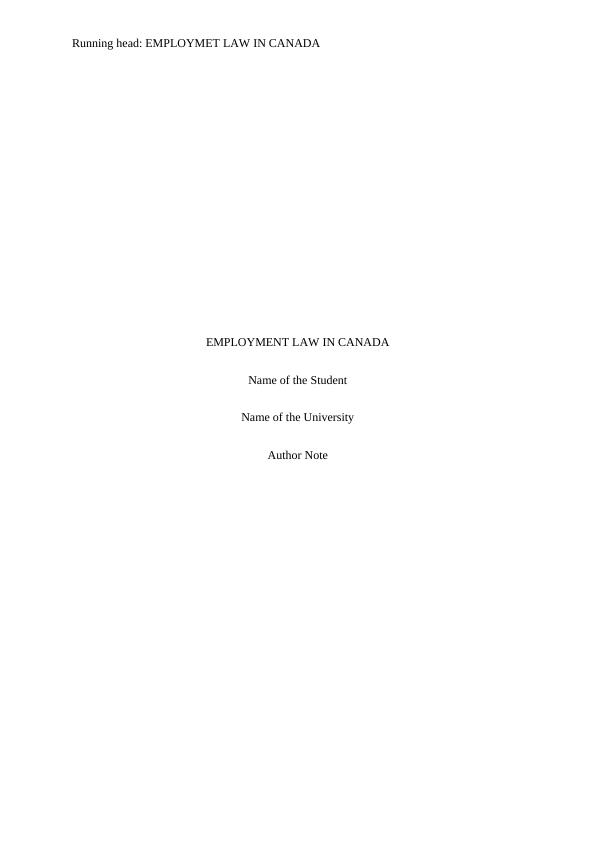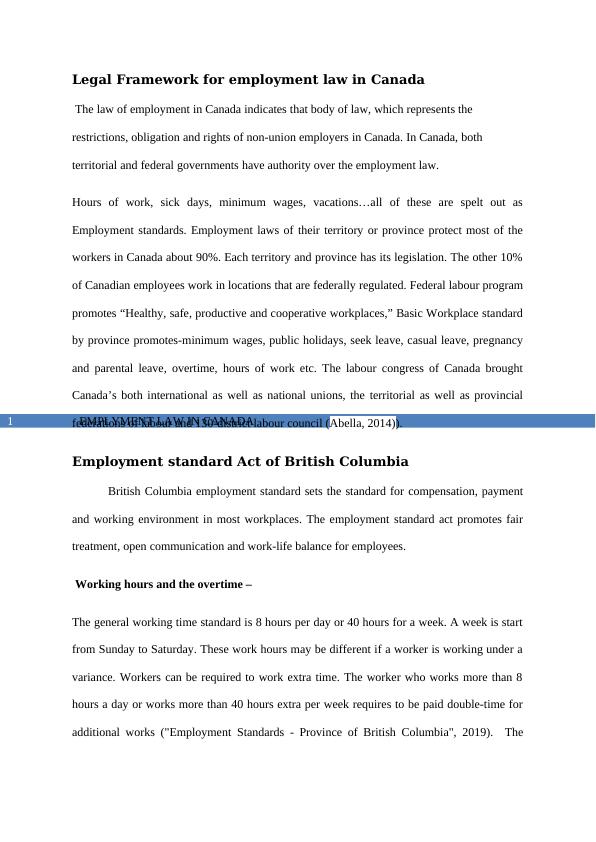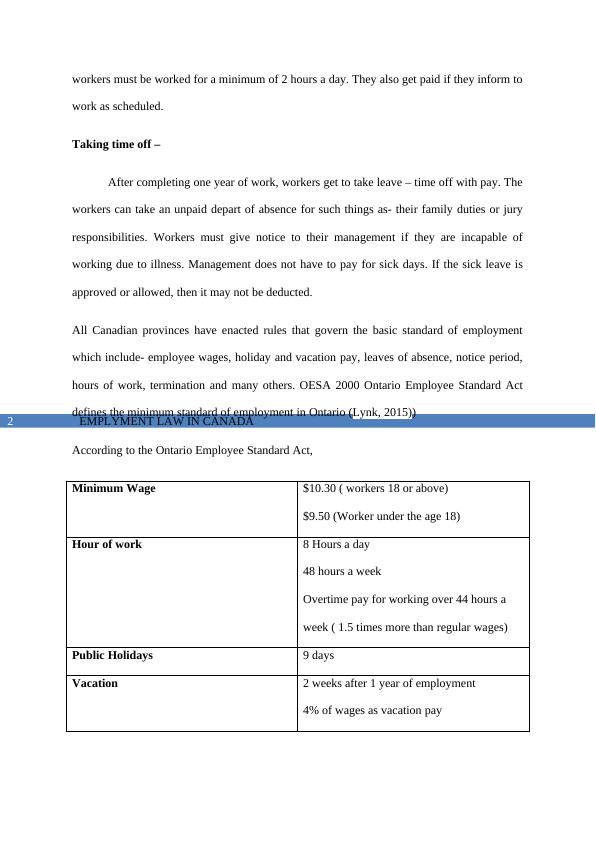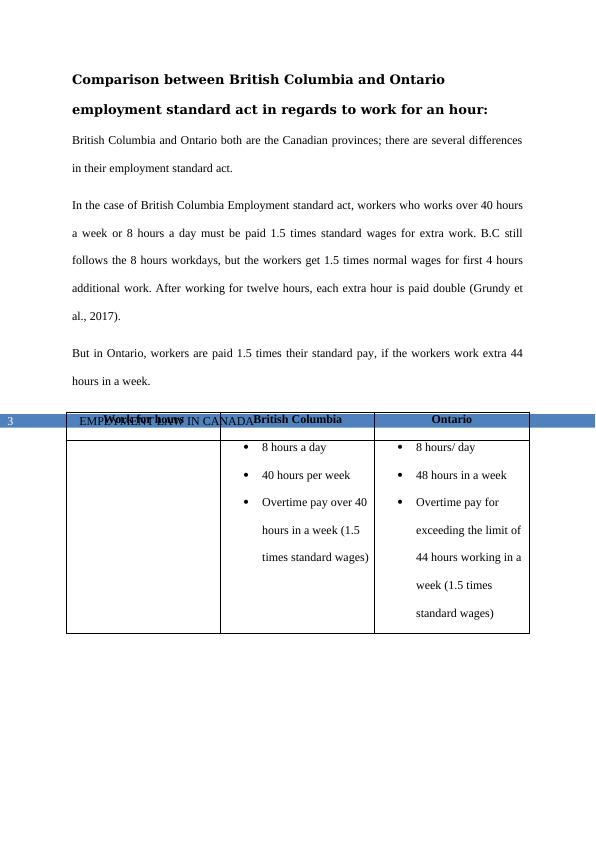Employment Law in Canada - Legal Framework, Standards, Acts and Comparison
Added on 2022-11-10
13 Pages2213 Words493 Views
Running head: EMPLOYMET LAW IN CANADA
EMPLOYMENT LAW IN CANADA
Name of the Student
Name of the University
Author Note
EMPLOYMENT LAW IN CANADA
Name of the Student
Name of the University
Author Note

EMPLYMENT LAW IN CANADA1
Legal Framework for employment law in Canada
The law of employment in Canada indicates that body of law, which represents the
restrictions, obligation and rights of non-union employers in Canada. In Canada, both
territorial and federal governments have authority over the employment law.
Hours of work, sick days, minimum wages, vacations...all of these are spelt out as
Employment standards. Employment laws of their territory or province protect most of the
workers in Canada about 90%. Each territory and province has its legislation. The other 10%
of Canadian employees work in locations that are federally regulated. Federal labour program
promotes “Healthy, safe, productive and cooperative workplaces,” Basic Workplace standard
by province promotes-minimum wages, public holidays, seek leave, casual leave, pregnancy
and parental leave, overtime, hours of work etc. The labour congress of Canada brought
Canada’s both international as well as national unions, the territorial as well as provincial
federations of labour and 130-district labour council (Abella, 2014)).
Employment standard Act of British Columbia
British Columbia employment standard sets the standard for compensation, payment
and working environment in most workplaces. The employment standard act promotes fair
treatment, open communication and work-life balance for employees.
Working hours and the overtime –
The general working time standard is 8 hours per day or 40 hours for a week. A week is start
from Sunday to Saturday. These work hours may be different if a worker is working under a
variance. Workers can be required to work extra time. The worker who works more than 8
hours a day or works more than 40 hours extra per week requires to be paid double-time for
additional works ("Employment Standards - Province of British Columbia", 2019). The
Legal Framework for employment law in Canada
The law of employment in Canada indicates that body of law, which represents the
restrictions, obligation and rights of non-union employers in Canada. In Canada, both
territorial and federal governments have authority over the employment law.
Hours of work, sick days, minimum wages, vacations...all of these are spelt out as
Employment standards. Employment laws of their territory or province protect most of the
workers in Canada about 90%. Each territory and province has its legislation. The other 10%
of Canadian employees work in locations that are federally regulated. Federal labour program
promotes “Healthy, safe, productive and cooperative workplaces,” Basic Workplace standard
by province promotes-minimum wages, public holidays, seek leave, casual leave, pregnancy
and parental leave, overtime, hours of work etc. The labour congress of Canada brought
Canada’s both international as well as national unions, the territorial as well as provincial
federations of labour and 130-district labour council (Abella, 2014)).
Employment standard Act of British Columbia
British Columbia employment standard sets the standard for compensation, payment
and working environment in most workplaces. The employment standard act promotes fair
treatment, open communication and work-life balance for employees.
Working hours and the overtime –
The general working time standard is 8 hours per day or 40 hours for a week. A week is start
from Sunday to Saturday. These work hours may be different if a worker is working under a
variance. Workers can be required to work extra time. The worker who works more than 8
hours a day or works more than 40 hours extra per week requires to be paid double-time for
additional works ("Employment Standards - Province of British Columbia", 2019). The

EMPLYMENT LAW IN CANADA2
workers must be worked for a minimum of 2 hours a day. They also get paid if they inform to
work as scheduled.
Taking time off –
After completing one year of work, workers get to take leave – time off with pay. The
workers can take an unpaid depart of absence for such things as- their family duties or jury
responsibilities. Workers must give notice to their management if they are incapable of
working due to illness. Management does not have to pay for sick days. If the sick leave is
approved or allowed, then it may not be deducted.
All Canadian provinces have enacted rules that govern the basic standard of employment
which include- employee wages, holiday and vacation pay, leaves of absence, notice period,
hours of work, termination and many others. OESA 2000 Ontario Employee Standard Act
defines the minimum standard of employment in Ontario (Lynk, 2015))
According to the Ontario Employee Standard Act,
Minimum Wage $10.30 ( workers 18 or above)
$9.50 (Worker under the age 18)
Hour of work 8 Hours a day
48 hours a week
Overtime pay for working over 44 hours a
week ( 1.5 times more than regular wages)
Public Holidays 9 days
Vacation 2 weeks after 1 year of employment
4% of wages as vacation pay
workers must be worked for a minimum of 2 hours a day. They also get paid if they inform to
work as scheduled.
Taking time off –
After completing one year of work, workers get to take leave – time off with pay. The
workers can take an unpaid depart of absence for such things as- their family duties or jury
responsibilities. Workers must give notice to their management if they are incapable of
working due to illness. Management does not have to pay for sick days. If the sick leave is
approved or allowed, then it may not be deducted.
All Canadian provinces have enacted rules that govern the basic standard of employment
which include- employee wages, holiday and vacation pay, leaves of absence, notice period,
hours of work, termination and many others. OESA 2000 Ontario Employee Standard Act
defines the minimum standard of employment in Ontario (Lynk, 2015))
According to the Ontario Employee Standard Act,
Minimum Wage $10.30 ( workers 18 or above)
$9.50 (Worker under the age 18)
Hour of work 8 Hours a day
48 hours a week
Overtime pay for working over 44 hours a
week ( 1.5 times more than regular wages)
Public Holidays 9 days
Vacation 2 weeks after 1 year of employment
4% of wages as vacation pay

EMPLYMENT LAW IN CANADA3
Comparison between British Columbia and Ontario
employment standard act in regards to work for an hour:
British Columbia and Ontario both are the Canadian provinces; there are several differences
in their employment standard act.
In the case of British Columbia Employment standard act, workers who works over 40 hours
a week or 8 hours a day must be paid 1.5 times standard wages for extra work. B.C still
follows the 8 hours workdays, but the workers get 1.5 times normal wages for first 4 hours
additional work. After working for twelve hours, each extra hour is paid double (Grundy et
al., 2017).
But in Ontario, workers are paid 1.5 times their standard pay, if the workers work extra 44
hours in a week.
Work for hours British Columbia Ontario
8 hours a day
40 hours per week
Overtime pay over 40
hours in a week (1.5
times standard wages)
8 hours/ day
48 hours in a week
Overtime pay for
exceeding the limit of
44 hours working in a
week (1.5 times
standard wages)
Comparison between British Columbia and Ontario
employment standard act in regards to work for an hour:
British Columbia and Ontario both are the Canadian provinces; there are several differences
in their employment standard act.
In the case of British Columbia Employment standard act, workers who works over 40 hours
a week or 8 hours a day must be paid 1.5 times standard wages for extra work. B.C still
follows the 8 hours workdays, but the workers get 1.5 times normal wages for first 4 hours
additional work. After working for twelve hours, each extra hour is paid double (Grundy et
al., 2017).
But in Ontario, workers are paid 1.5 times their standard pay, if the workers work extra 44
hours in a week.
Work for hours British Columbia Ontario
8 hours a day
40 hours per week
Overtime pay over 40
hours in a week (1.5
times standard wages)
8 hours/ day
48 hours in a week
Overtime pay for
exceeding the limit of
44 hours working in a
week (1.5 times
standard wages)

End of preview
Want to access all the pages? Upload your documents or become a member.
Related Documents
Impact of minimum wage on povertylg...
|7
|1567
|489
Ontario Employment Law Questionslg...
|6
|1382
|268
Minimum Wage and Living Wagelg...
|10
|2279
|158
The Employment Standards Act: A Comprehensive Guidelg...
|4
|509
|342
Employee and Labour Relations: Legislation and Benefits of Unionization in Canadalg...
|7
|1384
|75
Labor Law Changes in Ontario: Bill 148 and Bill 47lg...
|5
|907
|331
